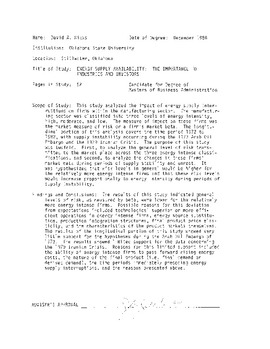| dc.contributor.author | Nicks, David A. | |
| dc.date.accessioned | 2015-09-29T19:58:43Z | |
| dc.date.available | 2015-09-29T19:58:43Z | |
| dc.date.issued | 1986-12 | |
| dc.identifier.uri | https://hdl.handle.net/11244/19251 | |
| dc.description.abstract | Scope of Study: This study analyzed the impact of energy supply interruptions on firms within the manufacturing sector. The manufacturing sector was classified into three levels of energy intensity, high, moderate, and low. The measure of impact on these firms was the market measure of risk or a firm's market beta. The longitudinal portion of this analysis covers the time period 1972 to 1982, with supply instability occurring during the 1973 Arab Oil Embargo and the 1979 Iranian Crisis. The purpose of this study was twofold. First, to analyze the general level of risk transmitted to the market place across the three energy intense classifications, and second, to analyze the changes in these firms' market beta during periods of supply stability and unrest. It was hypothesized that risk levels in general would be higher for the relatively more energy intense firms and that these risk levels would increase proportionally to energy intensity during periods of supply instability. | |
| dc.description.abstract | Findings and Conclusions: The results of this study indicated general levels of risk, as measured by beta, were lower for the relatively more energy intense firms. Possible reasons for this deviation from expectations included technological superior or more efficient operations in energy intense firms, energy source substitution, production integration structures, final product price elasticity, and the characteristics of the product markets themselves. The results of the longitudinal portion of this study showed very little support for the hypotheses during the Arab Oil Embargo of 1973. The results showed limited support for the data concerning the 1979 Iranian Crisis. Reasons for this limited support included the ability of energy intense firms to pass forward rising energy costs, the nature of the final product (i.e. final demand or derived demand), the time periods immediately preceding energy supply interruptions, and the reasons presented above. | |
| dc.format | application/pdf | |
| dc.language | en_US | |
| dc.rights | Copyright is held by the author who has granted the Oklahoma State University Library the non-exclusive right to share this material in its institutional repository. Contact Digital Library Services at lib-dls@okstate.edu or 405-744-9161 for the permission policy on the use, reproduction or distribution of this material. | |
| dc.title | Energy supply availability: The importance to industries and investors | |
| dc.contributor.committeeMember | Simpson, Gary W. | |
| osu.filename | Thesis-1986R-N632e.pdf | |
| osu.accesstype | Open Access | |
| dc.type.genre | Master's Report | |
| dc.type.material | Text | |
| thesis.degree.discipline | Business Administration | |
| thesis.degree.grantor | Oklahoma State University | |
